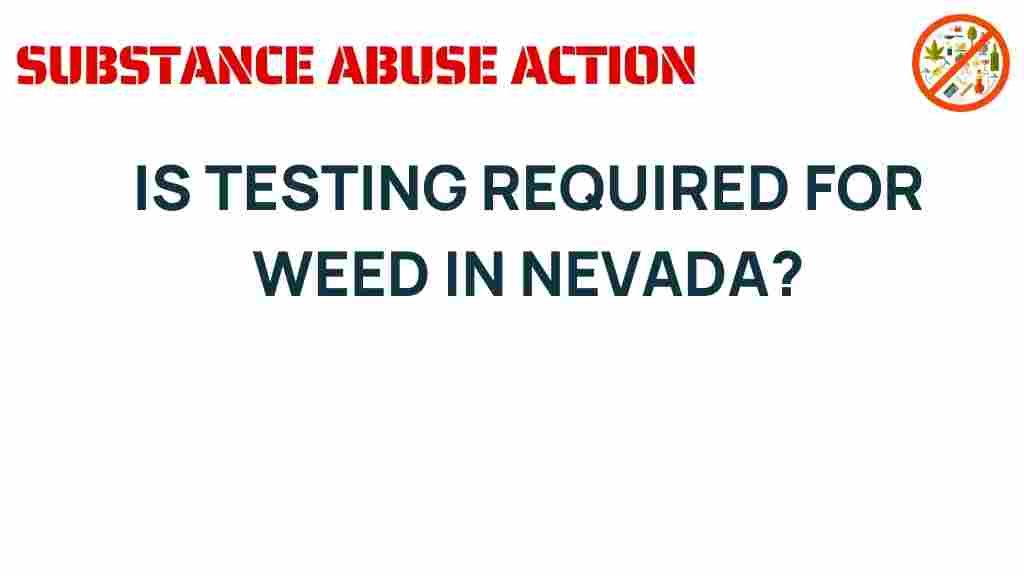Is Testing Required for Weed in Nevada? Understanding Weed Testing, Nevada Cannabis, and Regulations
The landscape of the cannabis industry in Nevada is dynamic and ever-evolving. With the legalization of marijuana for both medical and recreational use, the state implemented stringent marijuana regulations to ensure safety and quality. One of the key elements of these regulations is weed testing. In this article, we will delve into the requirements surrounding weed testing in Nevada, the implications for legal compliance, and how it impacts consumer safety and marijuana quality.
Understanding Nevada Cannabis Regulations
Nevada’s approach to cannabis involves a comprehensive framework designed to manage the cannabis industry effectively. The state has established laws that govern the cultivation, distribution, and sale of cannabis products. These regulations are aimed at ensuring not only legal compliance but also the safety of consumers.
- Legal Compliance: All cannabis products sold in Nevada must comply with state laws concerning testing and labeling.
- Consumer Safety: Testing helps eliminate harmful substances and ensures that consumers receive safe products.
- Marijuana Quality: Regular testing guarantees that the quality of cannabis aligns with industry standards.
The Importance of Weed Testing
Weed testing serves multiple purposes within the Nevada cannabis framework:
- Safety: Testing identifies contaminants such as pesticides, molds, and heavy metals that could pose health risks to consumers.
- Potency: Accurate testing provides information on the cannabinoid content, allowing consumers to make informed choices.
- Transparency: Lab testing results are often made available to consumers, fostering trust in the products they purchase.
What Are the Testing Requirements in Nevada?
In Nevada, the regulations stipulate that all cannabis products must undergo rigorous testing before they can be sold to consumers. Here’s a breakdown of the key requirements:
- Testing Laboratories: Only state-licensed laboratories can conduct testing on cannabis products. These labs must adhere to strict protocols to ensure accurate results.
- Testing Procedures: Products are tested for a variety of factors, including:
- Microbial contaminants
- Residual solvents
- Pesticides
- Heavy metals
- Cannabinoid potency
- Terpene profiles
- Labeling: All tested products must include a label that indicates pass/fail results for various contaminants, as well as information on cannabinoid concentrations.
Step-by-Step Process of Weed Testing in Nevada
Understanding how weed testing works can help consumers appreciate the quality and safety of the products they consume. Here’s a step-by-step guide to the testing process:
- Sample Collection: Cannabis products are collected from cultivators or manufacturers. Samples must be representative of the batch.
- Submission to Labs: Samples are submitted to a licensed laboratory for analysis.
- Testing Procedures: The lab conducts tests for contaminants and potency using established methodologies.
- Results Compilation: The lab compiles results and generates a report detailing the findings.
- Compliance Verification: Producers review the results to ensure that their products comply with state regulations.
- Labeling and Distribution: Products that pass testing are labeled accordingly and can be distributed to retailers.
Troubleshooting Common Issues in Weed Testing
While the testing process is designed to be thorough and reliable, there can be challenges. Here are some common issues and how to address them:
- Inconsistent Results: If results differ between labs, it may be necessary to retest with a different licensed laboratory.
- Failing Tests: If a product fails to meet safety standards, it cannot be sold. Producers should identify the cause and rectify issues before re-submission.
- Labeling Errors: Ensure that all labels are accurate and comply with state regulations to avoid legal repercussions.
The Future of Weed Testing in Nevada
The cannabis industry in Nevada is expected to keep evolving, and with it, the regulations around weed testing. As consumer awareness grows regarding marijuana quality and safety, the demand for transparency and thorough testing will likely increase. Here are a few trends to watch:
- Enhanced Testing Methods: Advances in technology could lead to more precise and faster testing methods.
- Increased Regulation: As the market matures, more regulations may emerge to ensure even higher standards of safety and quality.
- Consumer Education: There will likely be a push for better consumer education regarding cannabis testing and product safety.
Conclusion: The Role of Testing in Nevada’s Cannabis Industry
In conclusion, weed testing is a critical component of the cannabis industry in Nevada. It ensures legal compliance, promotes consumer safety, and enhances marijuana quality. Understanding the testing requirements and processes can empower consumers to make informed decisions about the products they choose. As the industry continues to grow, the importance of rigorous testing will only become more pronounced, helping to create a safe and reputable cannabis market in Nevada.
For more information on Nevada’s cannabis regulations and testing requirements, visit the Nevada State Government website. If you are a cannabis business owner looking to ensure compliance, consider consulting with experts in the field or refer to resources available at Cannabis Compliance Resources.
This article is in the category Prevention and created by SubstanceAbuseAction Team
